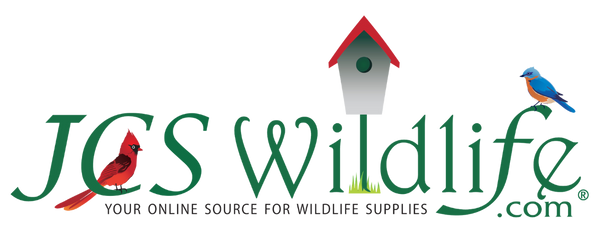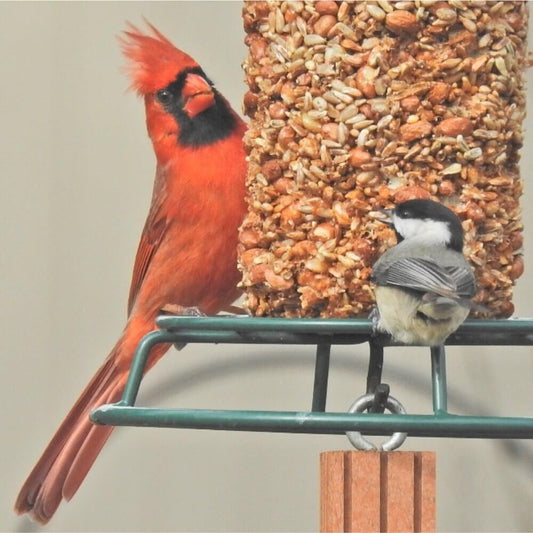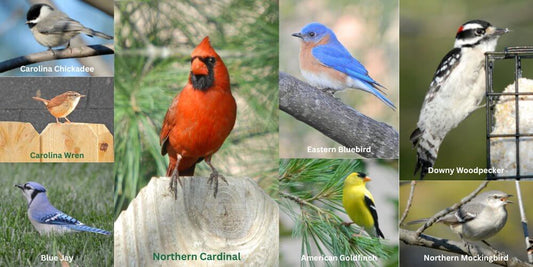-
American Goldfinch (1)
-
American Robin (1)
-
Baltimore Oriole (1)
-
Blue Jay (1)
-
Bluebirds (1)
-
Carolina Wren (1)
-
Chickadee (1)
-
Ducks (1)
-
Starling and House Sparrow (1)
-
House Finch (1)
-
House Wren (1)
-
Hummingbirds (5)
-
Northern Cardinal (1)
-
Northern Mockingbird (1)
-
Nuthatch (1)
-
Owls (3)
-
Tufted Titmouse (1)
-
Woodpeckers (6)
The Ultimate Guide to Choosing the Right Bird Food
Choosing the right bird food is crucial for bird's health, behavior and the overall well-being of our feathered friends. Did you know that birds rely on a diverse and nutritious diet to thrive in their natural habitat? By providing our wildlife birds with the right type of food, it not only supplements their natural diet but also encourages their presence in our backyards and surrounding areas.
When it comes to choosing your seed, there are several options:
Sunflower Seeds
Safflower Seeds
Nyjer or thistle seeds
White millet
Shelled and cracked corn
Peanuts (whole and shelled) and other types of nuts
Suet
Mealworms
And more...
Each type of seed will attract a different type of bird. For example, if you are trying to attract an American Goldfinch to your feeder, offer Nyjer (Thistle) seed or Sunflower Hearts, as Goldfinch do not eat insects or larger seeds with shells.
At JCS Wildlife, we recognize and understand the importance of choosing the right bird food, which is why we offer a wide range of premium bird seeds. From seed cylinders, cakes and suet to loose seed, our products are designed to meet the nutritional needs of various birds.

Understanding Bird Diets
Understanding bird diets is extremely crucial for ensuring optimal bird health. Different bird species have varying dietary needs and providing them with the right food is essential for their overall well-being. By understanding what types of food different birds require, you can attract a wide variety of species to your backyard and create a thriving bird-friendly environment.
Why is Understanding Bird Diets Important?
One of the main reasons why understanding bird diets is important is that it allows you to provide the right nutrition for each species. Just like humans, birds need a balanced diet to stay healthy and energetic. Different species have different preferences and requirements when it comes to food. For example, some birds are primarily seed eaters, while others prefer insects, fruits, or nectar.
Attracting Birds with the Right Food
By offering a diverse range of foods in your bird feeders, you can cater to the needs of various bird species. Here are some examples:
Sunflower seeds: Popular choice among many birds, including cardinals, finches, and chickadees.
Safflower seeds: Favorite among cardinals and doves.
Nyjer or thistle seeds: Highly sought after by finches.
Suet: High-energy food that attracts woodpeckers and other insect-eating birds.
Attracting Specific Bird Species
Understanding bird diets also allows you to attract specific bird species to your backyard.
For example:
To attract hummingbirds, provide a sugar-water solution in a hummingbird feeder. (4 parts water, 1 part sugar)
To attract woodpeckers, offer suet cakes or peanuts.
By catering to the dietary needs of different bird species, you can create a welcoming environment that attracts a wide variety of feathered friends.
Addressing Issues and Challenges
In addition to attracting birds, understanding their diets can also help you address any issues or challenges that may arise. For example, if you notice that certain bird species are not frequenting your feeders, it could be a sign that the food you are providing is not suitable for them. By adjusting your bird food offerings, you can encourage the desired bird species to visit your backyard.
JCS Wildlife Bird Food Options
To further enhance your knowledge of bird diets, JCS Wildlife provides a range of high-quality bird food options on their website. We offer products with ingredients such as:
Black oil sunflower seeds
Traditional sunflower seeds
Safflower seeds
Thistle or Nyjer seeds
Suet
Berries
-
Mealworms
These products are carefully selected to meet the specific dietary needs of various bird species.
Understanding bird diets is key to creating a thriving bird-friendly environment. By providing the right nutrition for different bird species, you can attract a wide variety of birds to your backyard and promote their overall health and well-being. JCS Wildlife offers a range of high-quality bird food options to help you cater to the dietary needs of different bird species. So, whether you want to attract cardinals, finches, woodpeckers, or hummingbirds, JCS Wildlife has the right food to make your backyard a bird paradise.

Bird Food Options for Attracting Birds to Your Backyard
When it comes to attracting birds to your backyard, one of the most important factors to consider is the type of bird food you offer. Different bird species have different dietary preferences, so it's essential to provide a variety of food options to accommodate their needs. In this section, we will explore the different types of bird food and discuss their benefits.
Seed Options
Sunflower Seeds: Sunflower seeds are one of the most popular and versatile bird foods. They are rich in protein and healthy fats, making them an excellent source of energy for birds. Sunflower seeds can attract a wide variety of bird species, including cardinals, finches, and chickadees. You can find different types of sunflower seeds, such as black oil sunflower seeds and traditional sunflower seeds, which vary in size and shell thickness.
Safflower Seeds: Safflower seeds are an excellent choice for attracting birds like cardinals, chickadees, and titmice. These seeds have a bitter taste that squirrels and some other unwanted critters dislike, making them a great option if you're trying to deter them from your feeders. Safflower seeds are high in protein and fat, providing birds with the energy they need.
Nyjer or Thistle Seeds: Nyjer or thistle seeds are tiny black seeds that are highly attractive to finches, such as goldfinches and house finches. These seeds are rich in oil and are a great source of nutrition for finches during the colder months. Nyjer seeds are best offered in specialized tube feeders with small ports to prevent waste.
White Millet: White millet is a small, round seed that is popular among ground-feeding birds like sparrows, juncos, and doves. Millet is a high-energy food that is easily digestible and provides essential nutrients for birds. You can scatter white millet on the ground or offer it in low tray feeders to attract ground-feeding species.
Shelled and Cracked Corn: Shelled and cracked corn are common bird food options that are loved by a wide variety of birds, including jays, crows, and doves. Corn is high in carbohydrates, providing birds with a good source of energy. It's important to note that whole corn kernels can be difficult for some birds to eat, so offering cracked or shelled corn is recommended.
-
Others: These are additional seed options that can attract a variety of birds, including sparrows, finches, and doves. Golden and red millet are small seeds that are often included in mixed bird seed blends. Flax seeds are rich in omega-3 fatty acids and can be a valuable addition to a bird's diet.
Other Bird Food Options
-
Suet: Suet is a high-energy food made from animal fat and
can be offered in suet feeders. It is especially beneficial during the colder months when birds need additional calories to stay warm. Suet attracts woodpeckers, nuthatches, and other insect-eating birds.
Peanuts: Peanuts are another high-energy food that can attract a variety of bird species, including woodpeckers, blue jays, and titmice. You can offer peanuts in shell or shelled form, but be sure to avoid salted or flavored peanuts.
Fruit and Berries: Some birds, such as orioles and waxwings, are attracted to fruit and berries. Offer sliced oranges, apples, or grapes in specialized feeders or place them on tray feeders. You can also plant berry-producing shrubs or trees in your yard to provide a natural food source.
Mealworms: Mealworms are a favorite food for insect-eating birds like bluebirds and wrens. They are high in protein and can be offered in specialized mealworm feeders or scattered on tray feeders.
By offering a variety of bird foods, you can attract a diverse range of bird species to your backyard. Experiment with different types of food and observe which species visit your feeders. Remember to keep your feeders clean and provide fresh food regularly to ensure the health and well-being of the birds. Happy bird watching!

Choosing Bird Food: Understanding the Dietary Preferences of Different Bird Species
When it comes to choosing bird food, there are several factors to consider. In this section, we will explore one of the main points from the section outline, which is the specific dietary preferences of different bird species. Understanding what types of food different birds prefer can help you attract the desired species to your backyard.
Birds have diverse dietary needs, and different species have different preferences when it comes to the types of food they consume. For example:
Some birds primarily feed on seeds
Others prefer insects, fruits, or nectar
By offering a variety of foods that cater to different bird species, you can create an inviting environment for a wide range of birds.
Popular Types of Bird Food
Sunflower seeds are a popular type of bird food. They are loved by many bird species, including cardinals, chickadees, and finches. Sunflower seeds are high in fat, making them a great source of energy for birds.
Safflower seeds are another common bird food. They are favored by cardinals, grosbeaks, and doves. Safflower seeds have a bitter taste that deters squirrels, making them a good option for squirrel-proofing your feeders.
Nyjer or thistle seeds are a favorite among finches, such as goldfinches and siskins. These tiny seeds are packed with nutrients and are best offered in specialized feeders with small openings to prevent waste.
Suet is a popular choice for attracting woodpeckers, nuthatches, and other birds that feed on insects. Suet is a high-energy food made from animal fat and can be provided in suet feeders or cages.
It's important to note that not all birds eat seeds or suet. Some birds, like hummingbirds, feed primarily on nectar. To attract hummingbirds to your backyard, you can set up hummingbird feeders filled with a sugar-water solution. It's crucial to maintain proper hygiene by regularly cleaning and refilling the feeders to prevent the growth of harmful bacteria.
Consider the Dietary Needs of Different Bird Species
When selecting bird food, it's essential to consider the specific dietary needs of the bird species you want to attract. Researching the feeding habits of different birds can help you choose the right food and increase the chances of attracting your desired species. You can find comprehensive guides and resources online that provide information on the preferred foods of various bird species.

Bird Feeding Challenges and Solutions
Bird feeding is a popular activity that brings joy and entertainment to bird enthusiasts. However, it also comes with its fair share of challenges. In this section, we will explore some common bird food challenges and provide solutions to overcome them.
Solution 1: Squirrel-Proof Feeders
One of the main challenges faced by bird feeders is dealing with squirrels. These crafty creatures can quickly empty a bird feeder, leaving nothing for the intended avian visitors. So, how can you squirrel-proof your bird feeders?
Use specific feeders or deterrents designed to keep squirrels at bay
Look for feeders with features that make it difficult for squirrels to access the food
Opt for feeders with weight-activated mechanisms that close off access to the food when a squirrel tries to land on it
Use feeders that have cages or baffles surrounding the feeding ports, allowing only smaller birds to access the food
Adjust the location of your feeders away from trees or other structures that squirrels can use as launching points
Mount feeders on poles or use squirrel baffles to prevent squirrels from reaching the food
Solution 2: Seasonal Bird Food Offerings
Another common challenge faced by bird feeders is determining the right bird food offerings based on the seasons. Birds have different dietary needs throughout the year, and providing the right food can attract a wider variety of species.
Winter:
During the winter months, when natural food sources are scarce, it's essential to offer high-energy foods like suet and black oil sunflower seeds. These foods provide the necessary fat and protein to help birds survive the cold weather. Additionally, offering fruits such as sliced apples or oranges can attract fruit-eating species like robins or waxwings.
Spring and Summer:
In the spring and summer, birds require more protein-rich foods to support breeding and nesting. Offering mealworms, nyjer seeds, or suet blends can attract a diverse range of birds. It's also a good idea to provide fresh water for drinking and bathing during these seasons.
By adjusting your bird food offerings based on the seasons, you can create a welcoming environment for birds year-round and enjoy the beauty of different species visiting your feeders.

Choosing the Right Bird Food Supplier
When it comes to choosing the right bird food supplier, there are several factors to consider. One of the main points to keep in mind is the trustworthiness of the supplier. After all, you want to ensure that the bird food you purchase is of high quality and safe for the birds that visit your backyard.
JCS Wildlife: A Trusted Supplier
JCS Wildlife is an online store that has established itself as a trusted supplier in the industry. We offer a wide range of bird feeders, bird food, owl boxes, and critter houses. With our extensive selection of products, you can find everything you need to create a bird-friendly environment in your backyard.
Unique Selling Points
What sets JCS Wildlife apart from other suppliers are our unique selling points. We take pride in our exclusive range of handcrafted birdhouses, premium bird food, and wildlife supplies. These products are carefully crafted and curated to meet the needs of different bird species.
Commitment to Customer Satisfaction
One of the advantages of choosing JCS Wildlife as your bird food supplier is our commitment to customer satisfaction. We offer free shipping on all orders within the continental United States, making it convenient for you to receive your bird food without any additional costs. We also have a low-price guarantee, ensuring that you get the best value for your money. In addition, JCS Wildlife has a hassle-free returns policy and a recycling pledge, demonstrating our dedication to reducing our carbon footprint.
Wide Range of Bird Food Options
When it comes to bird food options, JCS Wildlife offers a wide range of choices. We understand that different bird species have different dietary needs, so we provide a variety of bird food options to attract a diverse range of birds to your backyard. Whether you're looking for sunflower seeds, safflower seeds, thistle or Nyjer seeds, suet, or peanuts, JCS Wildlife has you covered.
Helpful Resources and Tips
Not only does JCS Wildlife offer a variety of bird food, but we also provide helpful resources and tips on bird feeding. Our website features informative articles on topics such as squirrel-proofing bird feeders and attracting specific bird species to your backyard. This valuable information can help you make informed decisions about the type of bird food you should offer to attract the birds you want to see.
Conclusion
When choosing a bird food supplier, it's important to consider factors such as trustworthiness, product quality, and customer service. JCS Wildlife stands out as a trusted supplier with their unique selling points, extensive range of bird feeders, bird houses, critter houses, food options, free shipping, low-price guarantee, hassle-free returns policy, and recycling pledge. With our wide selection of bird food and helpful resources, you can create a bird-friendly environment in your backyard and enjoy the beauty of nature up close.

Choosing the Right Bird Food for a Healthy Bird
Providing a diverse and nutritious diet is essential to support the energy needs and promote the overall health of our feathered friends. Choosing the right bird food is crucial for their well-being.
JCS Wildlife offers a wide range of bird feeders, bird food, and wildlife supplies to help you create a bird-friendly environment in your backyard. We have an exclusive range of handcrafted birdhouses and premium bird food to ensure that you are providing the best for your feathered visitors.
Free shipping on all orders within the continental United States
Low-price guarantee
Hassle-free returns policy
Recycling pledge to reduce their carbon footprint
JCS Wildlife also offers squirrel-proof bird feeders to attract a variety of bird species and keep squirrels at bay. These feeders provide a safe and inviting space for birds to dine.
By choosing the right bird food, you are not only supporting the health and well-being of birds but also creating a vibrant and lively ecosystem in your own backyard.
To get started, visit JCS Wildlife's website and explore our range of squirrel-proof bird feeders and other bird-related products. Customer service is always available to find the perfect bird feeder for your backyard.
Remember, every small action counts in creating a bird-friendly environment. Let's come together and make our backyards a haven for our feathered friends. Happy bird feeding!

No comments






0 comments